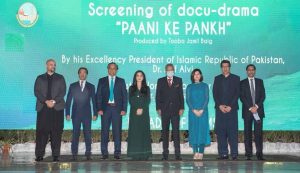Nations with the least carbon footprints will be affected the most due to Climate Change
6 min read
Equality has always been a contentious topic of discussion among the circles of human civilization. Often deemed as a necessary liberty, an innate right but one that is at best an imagined reality as stated by Yuval Noah in his book ‘Sapiens’.
The origin of equality is not a biological certainty but one that has its origins in the minds of men. The evolution of men has not harbored around the concept of equality but on the basis of “contextual evolution”; how the environment and culture dictated the evolution of men. Thus the idea of men being equal is inherently flawed and hence the idea of equity is of utmost importance.
Just as the developing world is catching up, there is a new problem brewing right in front of our eyes, threatening to not just derail our progress but simply put, destroy our existence or at the very least permanently alter human lives.
Climate change is upon us and threatens every aspect of our lives. It affects all of us, its damage devastating, mammoth in scale yet as a cruel hand of faith will have it. The effects of climate change are discriminatory.
According to a recent study published in the Proceedings of the National Academy of Science, in most poor countries, higher temperatures are more than 90% likely to have resulted in decreased economic output, compared to a world without global warming.

Meanwhile, the effect has been less dramatic in wealthier nations—with some even potentially benefiting from higher temperatures. A 2015 study in the journal Nature projected that the average income in the poorest countries will decline 75% by 2100 compared to a world without warming, while some of the richest countries could experience gains in income. And a landmark report released last fall from the Intergovernmental Panel on Climate Change (IPCC), the UN’s climate science body, showed that if global temperatures rise more than 1.5°C by the end of the century, poor countries will likely face critical challenges, including the destruction of entire communities and millions of premature deaths.
Many of the world’s developing countries have called foul. “This problem is created somewhere else,” Abdur Rouf Talukder, Bangladesh’s Finance Secretary, “We are spending more on adaptation because we have to live.”
Being equitable is to be fair and impartial. Being equitable is having the same opportunities to succeed or at the very least to survive. Equity is a holistic understanding of the paradigm that one operates in and understanding one’s progress within that realm. More so it goes beyond the idea of success, the principle of equity dictates that one should be accountable in the same proportion to one’s crimes for the damage inflicted, for the barbarity committed and for the everlasting scars that might be too deep to ever heal. Thus the idea of a world that is characterized by inequity is a world that is devoid of balance, marred by chaos and plundering. Balance is essential in any system that exists within a colony, especially human colonies. Societies fall apart if devoid of balance.
The first world with its rails and roads and gigantic factories has plundered the earth for its resources. The last two hundred years are an epitome in written history at how diligent the human race is in achieving economic prosperity but little did it realize that economic profitability at the cost of our environment. It is not tantamount to prosperity but rather the opposite, in fact something much worse than that.
One remarkable thing that the first world also did was to leave the rest of the world behind. The western civilization which championed the idea of democracy abandoned the very principles of perhaps its most laudable creation, inclusivity. Before the idea of gender or racial inclusiveness, the idea of economic inclusivity was apparent on everyone. Man-made disasters have had its toll on the path of ‘prosperity’ and its continuance lay in sharing economic growth. Thus at the behest of the world’s biggest economic powers the world left behind started to grow and soon enough some developing countries will be right beside the first world in terms of economic standing; Sharing the stage for economic growth yes, but for prosperity not even close.
The divergence from the path to prosperity has had one major contributing factor; climate change. Climate change threatens to not only erode economic gains of the last three decades but also threatens the very existence of billions of people living in developing countries. What seems even more unfair is that countries which will bear the brunt of climate related catastrophes have little to no impact on global Green House Gas (GHG) emissions.
According to the Global Climate Risk Index 2015, among the ten most affected countries (1994–2013), nine were developing countries in the low income or lower-middle income country group, while only one was classified as an upper-middle income country.
According to the German watch Global Climate Risk Index, Honduras, Myanmar and Haiti were the countries affected most by extreme weather events between 1994 and 2013.
The ten most affected countries by climate change have an accumulated GHG emissions of less than 2% of the global emissions and the unfortunate inequality in those that are the source and those who will bear the consequences of climate change is perhaps a harsh injustice but a catastrophic certainty.
Natural disasters are becoming increasingly frequent and destructive. The number of people affected by natural disasters doubled from approximately 102 million in 2015 to 204 million in 2016. Fewer people were affected in 2017, but at a higher price, with the year’s events costing a total of $335 billion and driving a 49% increase in economic losses over the previous decade. These damages can be nearly impossible for families living in poverty to overcome.
As climate events worsen, people are also threatened by more gradual changes, such as climbing temperatures and declining rainfall.
Droughts alone have affected more than 1 billion people in the last decade, and the damage hits the agriculture industry, which is the primary source of food and income for many people in the developing countries. Between 2006 and 2016, more than 80% of drought damage was absorbed by agriculture, and 2017 data from the World Bank reported drought has wiped out enough produce to feed 81 million people every day for a year since 2001.
With each passing day, the challenge of climate change becomes improbable to solve. The idea behind highlighting the inequality of climate change is to state that without the sincere involvement of developed countries in combating the challenge of climate change, it is impossible for the world to do anything about it.
Expenditure on climate risk adaptation and mitigation is of essential need. The World Bank has announced a total spending of USD 200 Billion over the next four years to invest in climate change infrastructure. The Green Climate Fund, which amounts to USD 10 Billion for climate finance in developing countries, are both encouraging steps but is at best a drop in the ocean.
Researchers estimate that climate financing needs are significantly higher with costs of climate change estimated at USD 1 trillion annually. For developing countries the problems of a burgeoning population, poor infrastructure and food security will be exacerbated in the coming years because of climate change. For a lot of them the problems are here with devastating effects.
Small islands and coastal communities are at higher risks. Thus far very little attention has been given to how climate change will affect ethnic and gender inequality in addition to inter-country inequality. The problems will continue to pile up unless those who have for centuries polluted the air we breathe, the water we drink and the food we eat should stand up and take responsibility.
What has been done cannot be undone but the future, a more equitable future can be realized if mistakes are not repeated, growth is more inclusive and those responsible are held accountable for it. Only then, can the fight against climate change be considered a truly global effort.







